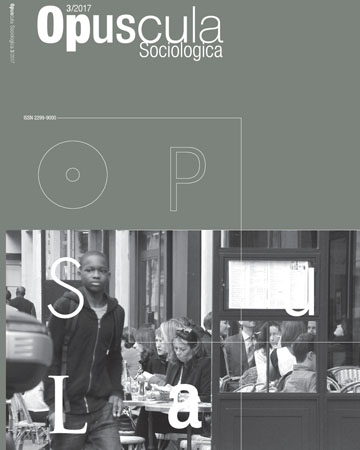
ISSN: 2299-9000
eISSN: 2353-2882
OAI
DOI: 10.18276/os.2017.3-02


Issue archive /
nr 3/2017
Obywatel: z państwem czy bez państwa? Stare i nowe koncepcje obywatelstwa
(The Citizen: with or without State? The Old and New Concepts of Citizenship)
| Authors: |
Daria
Łucka
Uniwersytet Jagielloński |
| Keywords: | citizenship transnationality postnationality |
| Data publikacji całości: | 2017 |
| Page range: | 15 (19-33) |
Abstract
The classical understanding of citizenship as connected with a state and a nation is being questioned by contemporary theories of transnational and postnational citizenship. According to these theories, citizenship is affected by the processes of “denationalisation”: it reaches beyond the borders of a nation state. However, the analysis of such new concepts shows that – although they correctly point out to many new phenomena – they still remain connected with a nation state, especially with a legal system at the level of a state. The goal of this article is to show that state policies may directly influence the processes of transnationalisation and postnationalisation of citizenship, either strengthening or weakening them.
Download file
Article file
Bibliography
| 1. | Bauböck, R. (1995). Transnational Citizenship: Membership and Rights in International Migration. Aldershot. Hants: Brookfeld, VT., E. Elgar. |
| 2. | Bauböck, R. (2002). How Migration Transforms Citizenship: International, Multinational and Transnational Perspectives. IWE – Working Papers Series, 24, 2–28. |
| 3. | 18 Przykłady krajów, w których denizens mają prawo do głosowania w lokalnych wyborach, podają m.in. Faist (2000, s. 206) oraz Łodziński, Pudzianowska i Szaranowicz-Kusz (2014, s. 15). |
| 4. | Bauböck, R. (2003). Towards a Political Theory of Migrant Transnationalism. International Migration Review, 37 (3), 700–723. |
| 5. | Bloemraad, I., Korteweg, A., Yurdakul, G. (2008). Citizenship and Immigration: Multiculturalism, Assimilation, and Challenges to the Nation-State. Annual Review of Sociology, 34, 153–179. |
| 6. | Bosniak, L. (2000). Citizenship Denationalized. Indiana Journal of Global Legal Studies, 7 (2), 447–509. |
| 7. | Brubaker, W.R. (1992), Citizenship and Nationhood in France and Germany. Cambridge, MA: Harvard University Press. |
| 8. | Castles, S. (2002). Migration and Community Formation under Conditions of Globalisation. International Migration Review, 36 (4), 1143–1168. |
| 9. | Castles, S. (2005). Nation and Empire: Hierarchies of Citizenship in the New Global Order. International Politics, 42, 203–224. |
| 10. | Earnest, D.C. (2006). Neither Citizen nor Stranger: Why States Enfranchise Resident Aliens. World Politics, 58 (2), 242–275. |
| 11. | Ersanilli, E., Koopmans, R. (2010). Rewarding Integration? Citizenship Regulations and the Socio-Cultural Integration of Immigrants in the Netherlands, France and Germany. Journal of Ethnic and Migration Studies, 36 (5), 773–791. |
| 12. | Faist, T. (2000). Transnationalisation in International Migration: Implications for the Study of Citizenship and Culture. Ethnic and Racial Studies, 23 (2), 189–222. |
| 13. | Gustafson, P. (2005). International Migration and National Belonging in the Swedish Debate on Dual Citizenship. Acta Sociologica, 48 (1), 5–19. |
| 14. | Greenfeld, L. (1992). Nationalism: Five Roads to Modernity. Cambridge, MA: Harvard University Press. |
| 15. | Joppke, Ch. (2003). Citizenship between De- and Re-Ethnicization. European Journal of Sociology, 44 (3), 429–458. |
| 16. | Łodziński, S., Pudzianowska, D., Szaranowicz-Kusz, M. (2014). Wprowadzenie. Analiza procesu przyznawania praw wyborczych na poziomie lokalnym cudzoziemcom z państw trzecich w wybranych krajach Unii Europejskiej. W: S. Łodziński, D. Pudzianowska, M. Szaranowicz-Kusz (red.), Prawa wyborcze dla cudzoziemców – tak czy nie? (11–29). Warszawa: Wydawnictwo Naukowe Semper. |
| 17. | Łucka, D. (2006). Naród a społeczeństwo obywatelskie. Rozważania teoretyczne. W: A. Flis (red.), Stawanie się społeczeństwa. Szkice ofarowane Piotrowi Sztompce a okazji 40-lecia pracy naukowej (225–244). Kraków: Universitas. |
| 18. | Łucka, D. (2010). Imigranci a społeczeństwo: w poszukiwaniu równowagi. Asymilacja, integracja i wielokulturowość oraz ich empiryczne implikacje. W: D. Pietrzyk-Reeves, M. Kułakowska (red.), Studia nad wielokulturowością. Kraków: Księgarnia Akademicka. |
| 19. | Marshall, T.H. (1950). Citizenship and Social Class and Other Essays. Cambridge: Cambridge University Press. |
| 20. | MIPEX. (2015a). Access to Nationality. Migrant Integration Policy Index. Pobrano z: www.mipex.eu/access-nationality (12.01.2017). |
| 21. | MIPEX. (2015b). Permanent Residence. Migrant Integration Policy Index. Pobrano z: www.mipex.eu/permanent-residence (12.01.2017). |
| 22. | Portes, A., Guarnizo, L.E., Landolt, P. (1999). The Study of Transnationalism: Pitfalls and Promise of an Emergent Research Field. Ethnic and Racial Studies, 22 (2), 217–237.33 |
| 23. | Sassen, S. (2002). Towards Post-National and Denationalized Citizenship. W: E.F. Isin, B.S. Turner (red.), Handbook of Citizenship Studies (277–291). London: Sage. |
| 24. | Sejersen, T.B. (2008). “I Vow to Thee My Countries”: The Expansion of Dual Citizenship in the 21st Century. International Migration Review, 42 (3), 523–549. |
| 25. | Smith, R.M. (2002). Modern Citizenship. W: E.F. Isin, B.S. Turner (red.), Handbook of Citizenship Studies (105–115). London: SAGE. |
| 26. | Soysal, Y.N. (1994). Limits of Citizenship. Migrants and Postnational Membership in Europe. Chicago: The University of Chicago Press. |
| 27. | Szacki, J. (1997). Wstęp. Powrót idei społeczeństwa obywatelskiego. W: J. Szacki (red.), Ani książę, ani kupiec: obywatel. Idea społeczeństwa obywatelskiego w myśli współczesnej (5–62). Kraków: Znak. |
| 28. | Vertovec, S. (2012). Transnarodowość, przeł. I. Kołbon. Kraków: Wydawnictwo UJ. |